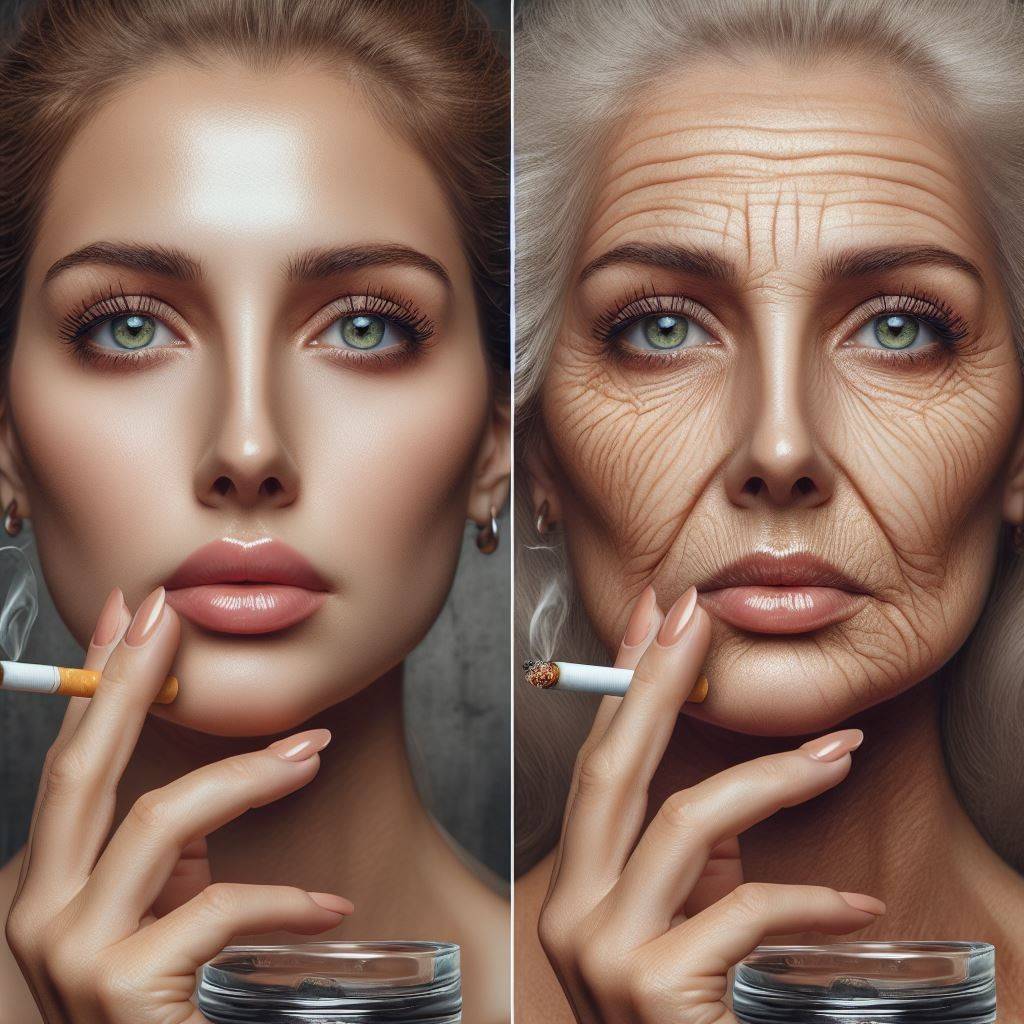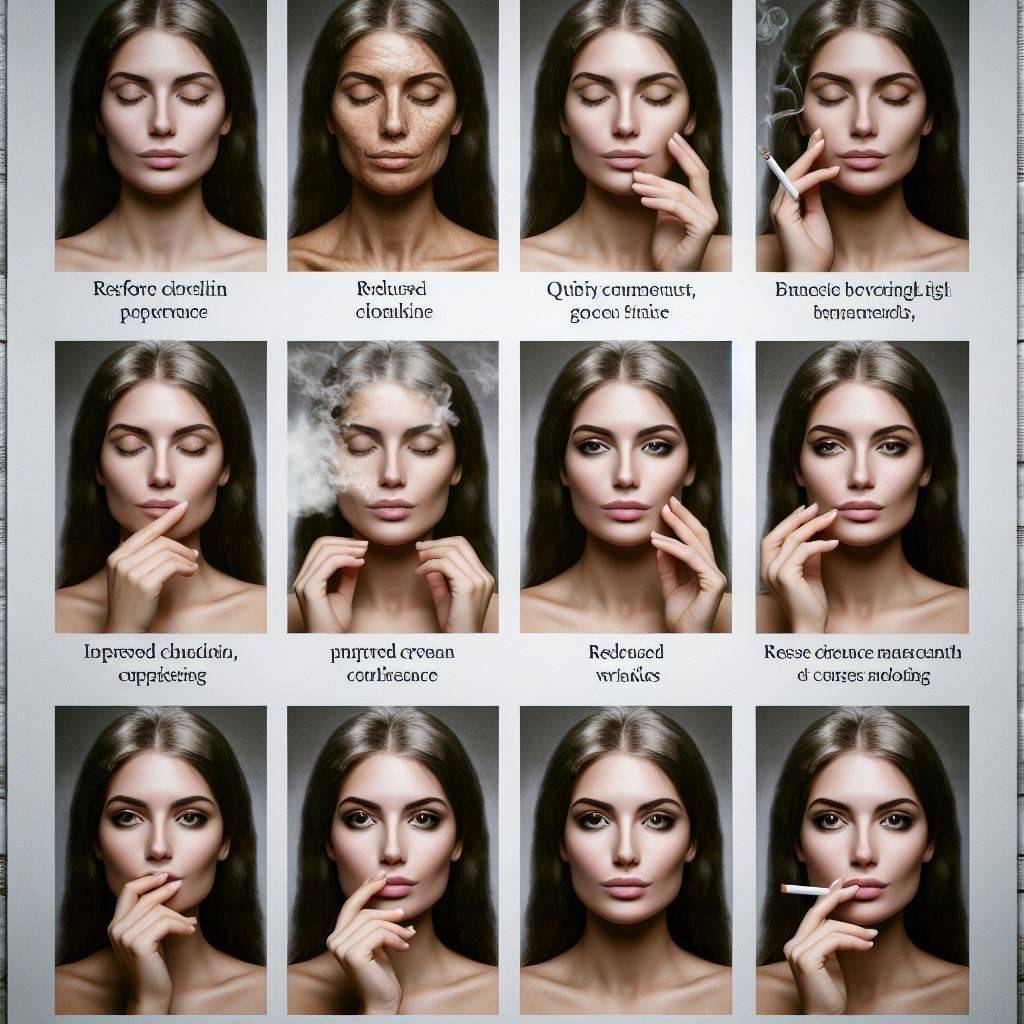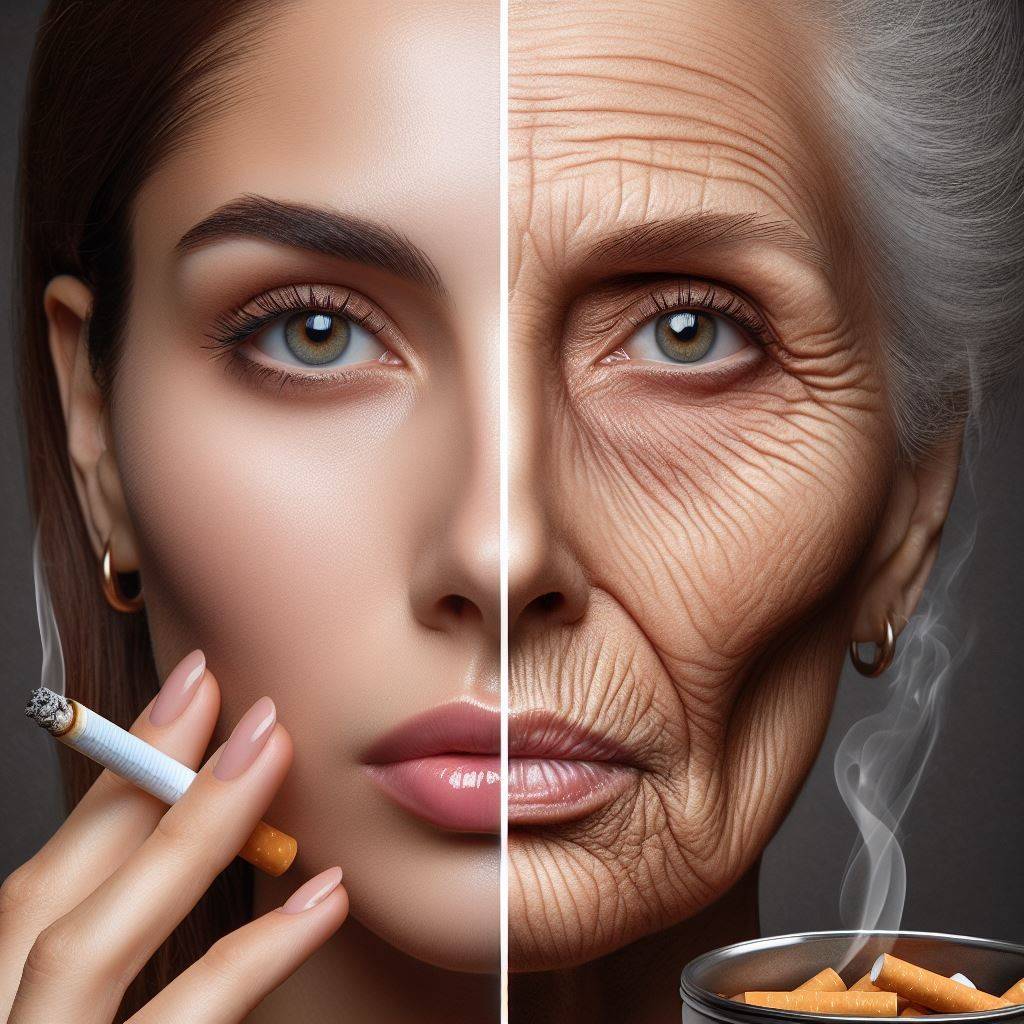Smoking Impact on Skin: A Comprehensive Look at Skin Damage
Smoking can have many negative effects on skin health. In this comprehensive guide, we’ll examine Smoking Impact on Skin and the various types of skin damage that can occur from tobacco use.
Introduction
Cigarette smoking is highly damaging to your overall health, including your skin. Smoking Impact on Skin manifests in various ways – from dullness and wrinkling to more serious conditions like psoriasis and skin cancer.
Understanding the skin hazards of smoking can help motivate you to quit. Keep reading to learn all about how smoking affects your skin’s health and appearance.
How is Smoking Impact on Skin Health?

here is the list of the impact of shocking on skin health as follows :
Smoking Causes Premature Aging and Wrinkles
One of the most noticeable Smoking Impacts on the Skin is increased wrinkling and premature aging. The many toxins in cigarette smoke damage collagen and elastin – the fibers that keep skin firm and elastic.
This causes prominent wrinkles and fine lines to develop earlier in smokers. Facial wrinkling from smoking regularly occurs in your late 30s or early 40s.
Smoking also depletes nutrients like vitamin A from skin tissue. This vitamin helps support collagen. With less collagen and elastin, skin loses its youthful plumpness and becomes saggy.
Overall, research shows people who smoke look 1.4 to 4.4 years older than non-smokers of the same age. The more you smoke, the worse skin aging becomes.
Dull, Uneven Skin Tone from Smoking
Another impact of Smoking Impact on the skin is a dull, uneven complexion. The thousands of chemicals in smoke narrow blood vessels in the outer skin layers.
This impairs blood flow and oxygen supply to skin tissue. Nutrient absorption also declines. The result is an uneven, sallow, dull skin tone rather than a healthy glow.
Free radical damage from smoke also degrades the quality of skin cell membranes. This causes irregular pigmentation and age spots to develop.
Smokers tend to have a grayish hue to their skin versus non-smokers with more clarity and brightness.
Delayed Wound Healing
Smoking delays wound healing times because of the constricted blood vessels and reduced oxygen supply.
Lacerations, cuts, burns, wounds from surgery, and other skin injuries heal about 60% slower in smokers compared to non-smokers. This puts smokers at a higher risk of wound infections.
Research shows nicotine, in particular, interferes with fibroblast migration and proliferation. Fibroblasts are cells that create collagen to repair injured skin tissue. Slower collagen development impairs healing.
Smoking’s impact on wound healing is most pronounced in areas far from the heart, like the legs and feet.
Increased Risk of Skin Cancer
The carcinogens in tobacco smoke substantially increase skin cancer risks. Smokers have a 2-4 times higher likelihood of developing squamous cell carcinoma compared to non-smokers.
Squamous cell carcinoma is one of the main types of skin cancer. It originates in the flat squamous cells of the outer skin layers.
Tobacco use also doubles the risk of melanoma – the most dangerous type of skin cancer. The more you smoke, the greater your melanoma risk.
Even secondhand smoke exposure raises skin cancer risks. Nonsmokers living with a smoker have a 20-30% higher risk of developing skin malignancies.
Higher Incidence of Psoriasis
Smoking’s Impact on the Skin is also evident as increased psoriasis risk. This chronic inflammatory skin disease causes itchy, red patches with silvery scales.
Studies show regular smokers have a nearly 2-fold higher risk of developing psoriasis. For heavy smokers, the psoriasis risk is 3-fold higher compared to non-smokers.
If you already have psoriasis, smoking makes the condition more resistant to treatment. Symptoms flare up more frequently and become more severe.
Research suggests nicotine activates inflammatory pathways that exacerbate psoriasis. Quitting smoking typically improves the disease.
Other Skin Conditions More Common in Smokers
Aside from wrinkles, skin cancer, and psoriasis, tobacco use also causes other skin disorders. These include:
- Erythema a ligne: A blotchy, brown skin discoloration on areas repeatedly exposed to heat from cigarettes. Often seen on the forearms.
- Eczema: Itchy, irritated skin prone to flaring up. Smoking worsens symptoms.
- Hidradenitis suppurativa: Chronic skin condition marked by painful bumps and abscesses in areas like the armpits and groin. Risk is higher in smokers.
- Oral cancer/lesion: Mouth sores, gum disease, and oral cancer risks increase because of direct contact with smoke.
Benefits of quitting smoking on Skin Health

The positive Smoking Impact on the Skin doesn’t have to be permanent. Your skin begins rejuvenating as soon as you quit smoking.
Collagen production rebounds, helping fill in wrinkles and sagging. Skin tone becomes brighter, more even, and luminous again. Age spots start fading.
Blood flow and oxygenation improve, speeding up healing. Nutrient absorption is better for nourishing skin cells.
Psoriasis may enter remission or become less aggressive with treatment after quitting. Skin cancer risks also steadily decline and approach that of non-smokers after 5-10 years.
While past skin damage can’t be undone, quitting can help prevent excessive future aging. It’s never too late to quit and experience real skin health improvements!
FAQs about Smoking Impact on Skin
How does smoking affect my skin?
Smoking can damage your skin in several ways. The chemicals and toxins in cigarette smoke reduce blood flow and oxygen to your skin. This causes your skin to become dull, uneven, and wrinkled. Smoking also breaks down collagen and elasticity, leading to sagging skin and deeper wrinkles. It delays wound healing, increases skin cancer risk, and worsens skin conditions like psoriasis. Smoking prematurely ages your skin and robs it of a healthy, youthful appearance.
Does skin improve after quitting smoking?
Yes, quitting smoking can lead to noticeable improvements in your skin’s health and appearance. Within a few weeks, your blood circulation, and oxygen levels will increase. This makes your skin look brighter and more glowing. Collagen production will also rebound over the next few months, helping fill in lines and wrinkles. Age spots will start fading too. The longer you go without smoking, the more your skin will rejuvenate. While past damage can’t be reversed completely, quitting prevents excessive future aging.
Does smoking permanently damage the skin?
Smoking does cause some permanent skin damage that can’t be undone. However, your risk of future skin aging and issues will be much lower if you quit. Once you stop smoking, your skin cancer risks will fall steadily. Within 5-10 years, your risk approaches that of someone who never smoked. Your skin also won’t continue worsening at an accelerated rate from the ongoing damage. So quitting can help stop permanent damage before it’s too late.
Does nicotine damage skin?
Yes, nicotine is one chemical in cigarette smoke that harms your skin. It constricts blood vessels, limiting oxygen and nutrients to skin tissue. Nicotine also impairs collagen production and wound healing. It may worsen some skin disorders like psoriasis. Nicotine exposure from smoking makes your skin more vulnerable to premature aging and a dull, uneven tone. Going nicotine-free is an important part of improving skin health.
The Bottom Line
Smoking substantially worsens many aspects of skin health – from cosmetic issues like wrinkles to serious diseases like skin cancer. Smoking’s Impact on Skin happens through:
- Breakdown of collagen/elastin, leading to sagging skin and wrinkles
- Constricted blood vessels that reduce oxygen and nutrients to skin tissue
- Impaired wound healing and higher infection risks
- Increased risks of skin cancer, psoriasis, eczema, and other skin disorders
Fortunately, quitting smoking can help reverse this damage and return your skin to a healthier state. The sooner you quit, the better your skin will look and feel.



